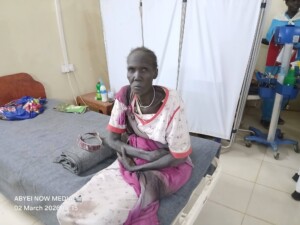Sudan timeline October-December 2020: Peace accord signed, COVID second wave bites, security fears as UNAMID withdraws
The signing of the Juba Peace Agreement in October was a glimmer of hope for a peaceful future in Sudan, however, there has been little immediate relief to the general public from ongoing economic woes, and chronic shortages of basic commodities such as bread and fuel. This was exacerbated by the second wave of COVID-19 infections.
 The Juba Peace Agreement is signed while the country is drowning - cartoon by Omar Dafallah (RD)
The Juba Peace Agreement is signed while the country is drowning - cartoon by Omar Dafallah (RD)
The signing of the Juba Peace Agreement in October was a glimmer of hope for a peaceful future in Sudan, however, there has been little immediate relief to the general public from ongoing economic woes, and chronic shortages of basic commodities such as bread and fuel. This was exacerbated by the second wave of COVID-19 infections.
Protests against the shortages, the March of the Millions expressing dissatisfaction with the slow pace of implementing the aims of the revolution, and frustration and concerns about security issues were widespread. The terms of the Juba agreement were also not welcomed everywhere, and the Eastern Sudan protocol of the agreement triggered clashes.
Politically, Sudan’s Sovereign Council President, Abdelfattah El Burhan, has been strongly criticised for forming the Transitional Partners Council (TPC) comprised of military, civilian, government, and opposition elements, to direct the transitional period.
Transitional justice – particularly for deposed dictator Omar Al Bashir and other International Criminal Court (ICC) indictees, seemed to move a step closer as the ICC Prosecutor Fatou Bensouda visited Sudan for the first time since the UN Security Council referred the situation in Darfur to the court 15 years ago. At the same time, cases emerged in Sudan alleging illegal detention, torture, of activists, and the murder of at least one, reflecting methods more often associated with the former regime.
Escalating conflict across the border in Tigray in Ethiopia saw an influx of thousands of refugees into Sudan, further stretching resources. Relations between Sudan and Ethiopia are already strained over negotiations on the Grand Ethiopian Renaissance Dam (GERD).
As 2020 drew to a close, the final withdrawal of the United Nations-African Union Mission in Darfur (UNAMID) deepened security concerns in Darfur as the region, in fear of the vacuum left behind after the withdrawal of the peacekeepers in accordance with the UN Security Council's resolution No. 2559.
Radio Dabanga carries ongoing daily coverage and comment on the situation in Sudan.

after signing the peace deal in Juba (Social media)
Timeline Sudan September-December 2020
October: Juba Peace Agreement signed, ICC prosecutor visits Sudan, fuel subsidies are lifted.
October 1: Sudan’s severe bread and fuel shortages continue to trigger protests. The rampant insecurity in Central Darfur is to be quelled by paramilitaries of the Rapid Support Forces. The total number of COVID-19 cases in Sudan since March reaches 13,460.
October 2: Flour and fuel shortages continue in Sudan amid unrest. Darfur farmers demand protection during the agricultural season. Five members of the FEED Arts group are released from prison in Khartoum.
October 3: The Juba Peace Agreement is signed with a strong local and international presence, after year-long negotiations between the members of the Sudan Revolutionary Front (SRF) and the Sudanese government. The country witnesses various strikes and vigils as workers demand reforms and higher salaries.
October 4: The UN calls on Sudan to ratify international human rights conventions. The High Council of Beja Nazirs blames the eastern Sudan protocol in the peace agreement for the recent clashes in the region. The Armed Struggle Movements coalition rejects the peace agreement. The Governor of Kassala replaces three ministerial directors affiliated with the former regime by three women.
October 5: Prime Minister Abdallah Hamdok expects a peace deal with the holdout rebel groups in Sudan soon. Protests take place in Kassala against the replacement of the three ministerial directors. Herders hold a vigil in Central Darfur against recurring violence. A Sudanese economist reports huge youth unemployment rates in the country.
October 6: Protests against unprecedented price increases continue throughout Sudan. Peace talks with the Sudan People’s Liberation Movement-North faction under the leadership of Abdelaziz El Hilu (SPLM-N El Hilu) are set to resume later this month. Six young artists of the FEED Arts group are still imprisoned. The Red Sea state protests against the eastern Sudan peace protocol continue. The State of Health Emergency is declared in West Darfur amid a rise of chikungunya cases.
October 7: The UN Human Rights Council welcomes Sudan’s recent progress. The defence lawyers of 28 former government leaders, including ousted dictator Omar Al Bashir, stage a walkout in court. Protesters against the eastern Sudan protocol temporarily reopen Khartoum-Port Sudan road.
October 8: COVID-19 and chikungunya cases continue to rise while medicine supplies dwindle. The wali (governor) of West Darfur declares Misterei a disaster area because of the rampant insecurity in the area. In South Darfur, 39 people will face trial for a village attack that left at least 15 dead. Various sit-ins and strikes continue across Sudan.
October 9: Thousands of Sudanese gather in Khartoum to celebrate the peace agreement. The Wali of Kassala announces a plan to achieve peace in eastern Sudan after weeks of unrest. The Ministry of Finance estimates that the implementation of the Juba Peace Agreement 3 will cost Sudan $7,550 billion.
October 10: The International Criminal Court (ICC) rejects an interim release request of former Darfur janjaweed leader Ali Kushayb. The UN Security Council (UNSC) welcomes Sudan’s Peace Agreement. Sudanese activists welcome the Peace Agreement’s impact on the position of women in Sudan.
October 12: Various sit-ins against insecurity, corruption, and the economic crisis take place across the country. Ethiopian gunmen prevent farmers from harvesting in El Gedaref. The Sudanese government takes its first steps to implement the peace agreement. The participation of young Sudanese in politics is low, according to a political scientist.
October 13: The government plans to align the domestic fuel price with international price levels. Rebel leader Minni Minawi calls for clear criteria for the selection of the new Sovereign Council members, ministers, and state governors. Farmers of Sudan’s El Gezira Agricultural Scheme demand support and justice.
October 14: Ousted President Al Bashir is questioned by the Darfur War Crimes Investigation Commission. PM Hamdok dismisses Kassala Governor Saleh Amar, stirring protests.
October 15: The dismissal of the Kassala governor triggers fighting in the state. Women are kidnapped by Ethiopian gunmen in El Gedaref. Northern State allegedly faces a new Rift Valley Fever epidemic.
October 16: Governors of the five Darfur states discuss security concerns, the economy, and social issues at the first Coordination Forum in Nyala. Eight are killed in the demonstrations in Kassala.

October 17: ICC Prosecutor Fatou Bensouda arrives in Khartoum for the first time, 15 years after the UNSC referred the situation in Darfur to the court. Three border crossings between Blue Nile state and Ethiopia are officially re-opened. Sudanese are set to protest the dire living conditions in the country as inflation reached 212.29 per cent in September.
October 18: The Darfur Bar Association describes the visit of the ICC Prosecutor as historic for Sudan, in particular for the families of victims.
October 19: Darfur displaced urge international humanitarian organisations to provide urgent aid to flood victims. The Juba Peace Agreement is officially integrated into the 2019 Constitutional Document. The ICC prosecutor calls her meeting with PM Hamdok “productive”. More people are killed in eastern Sudan protests against the dismissal of Kassala Governor Saleh Ammar.
October 20: USA President Trump pledges to remove Sudan from the list of State Sponsors of Terrorism (SST) after Sudan has paid the required compensation. Polio, malaria, and COVID-19 cases rise in the country. Eastern Sudanese leaders denounce the political violence between tribal groups in the region, and call for “peaceful coexistence”.
October 21: The government of Kassala issues an emergency order to contain the continuing unrest. Bridges and roads are closed in Khartoum to prevent protesters from setting up a new sit-in during the Marches of the Millions. Various protests and strikes take place in the country, calling for security, justice, and a return to the course of the revolution.
October 22: Thousands took to the streets in Khartoum and other state capitals to participate in the October 21 Marches of the Millions. A protester is killed, when security forces fire at demonstrators in Khartoum North. EU and UK welcome Sudan’s removal from the US SST list.
October 23: President Donald Trump official announcement of the US intention to remove Sudan from SST list, coincides with a joint statement by Sudan, the USA, and Israel on the normalisation of their relations. Protests take place against police brutality during the Marches of the Millions two days ago. The World Bank launches a special COVID-19 relief fund for Sudan.
October 24: The Sudanese government, the EU, and the World Bank sign a $370 million grant agreement to implement the first phase of Sudan’s Family Support Programme ‘Samarat’. Two more are killed in Gireida, South Darfur, after days of tribal clashes in which at least 14 died.
October 25: Senior Public Prosecutor Tajelsir El Hibir forms a committee to investigate the violence used by security forces during the Marches of the Millions four days ago.
October 26: Political parties in Sudan are divided about the normalisation of relations with Israel. The UN, AU, and Sudan confirm the exit of UNAMID on December 31, as planned.
October 27: Sudan, Ethiopia, and Egypt resume negotiations on the Grand Ethiopian Renaissance Dam (GERD). Religious leaders and heads of Sufi orders sign the International Religious Freedom Round Table Declaration in Khartoum. The Sudanese Ministry of Justice announces a draft law for the Transitional Justice Commission.
October 28: The Sudanese government announces a 400 per cent increase in fuel prices. Sudan and South Sudan establish new free trade zones to promote border trade. Relatives of detained former janjaweed leader Musa Hilal and his followers in North Darfur demand his release. The Kanabi Congress, uniting roughly nine million Sudanese seasonal workers, demands better housing and services.
October 29: The government officially takes over control of the Jebel Amer gold mines in North Darfur from Al Junaid Company. New Khartoum protests demand justice for those killed and detained during the Marches of the Millions. The Sudanese government extends COVID-19 testing for travellers. A conference for peaceful coexistence between Fallata and Masalit tribesmen is held in South Darfur after recent deadly clashes in Gireida. In North Darfur, women protest against marginalisation in camps for the displaced.
October 30: Sudan and South Sudan sign a military cooperation agreement. National Umma Party (NUP) leader El Sadig El Mahdi and other Sudanese government officials test positive for COVID-19. In Juba, the Sudanese government and the SPLM-N El Hilu discuss the possibility of a secular Sudan. People in eastern El Gedaref complain about more attacks by Ethiopian gunmen (shifta).
November: Civil war breaks out in Tigray, Ethiopia, COVID-19 numbers are on the rise again, eastern Sudanese Beja leaders strongly oppose the Juba Peace Agreement
November 1: Herders clans clash in Talodi locality, South Kordofan. COVID-19 cases in the country continue to rise.
November 2: Sudan and the USA sign a ‘historic’ bilateral agreement to normalise relations. The International Committee of the Red Cross (ICRC) estimates that one in four Sudanese face food insecurity. In Khartoum, a vigil demands the results of the investigation into the June 3 massacre. People in Nile River state protest the lack of fuel, bread, and transport. The roadblocks in El Gedaref continue for the fifth day in a row, in protest against the recurrent attacks by Ethiopian gunmen.
November 3: The Sudanese government rejects the recommendations of a workshop in Juba to facilitate peace talks with the SPLM-N El Hilu. The USA applauds the ‘dramatic progress’ in Sudan after signing the bilateral agreement. Large parts of Sudan experience power blackouts as the government fails to pay an outstanding bill. The Sudanese Journalists Network is awarded the Press Freedom Award 2020. NUP leader El Mahdi, infected with the coronavirus, is transferred to a hospital in the United Arab Emirates.
November 4: The joint Sudan and South Sudan Boundary Demarcation Commission resumes negotiations in Juba to define the mutual border. In White Nile state, protesters threaten to close that very same Sudan-South Sudan border to enforce their demands for the establishment of free trade zones and better roads.
November 5: The government of Ethiopia launches a military operation Tigray, neighbouring eastern Sudan, in a standoff with the Tigray People’s Liberation Front (TPLF). GERD negotiations between Egypt, Ethiopia, and Sudan fail. Several political and civil society groups reject the accords on the regional Sudan tracks included in the Juba Peace Agreement. The Resistance Committees in Khartoum walk out on a meeting with the Forces for Freedom and Change (FFC) on the formation of the Legislative Council.
November 6: Kassala closes its border with Ethiopia as tensions in the Tigray region increase. The governor of Central Darfur announces a new disarmament campaign in the region. The Sudanese Professionals Association (SPA) warns that the proposed plans for using quota for the Legislative Council will be inefficient. Activists in North Kordofan denounce the State of Emergency in the state. The office of the Sudanese Forces for Change Alliance’s was raided by agents of the General Intelligence Service (GIS).
November 8: PM Hamdok congratulates USA President-Elect Joe Biden on his election victory.
November 9: According to Sudan’s irrigation minister the latest GERD talks failed because of disagreements about the negotiation methodology and the role of AU experts. Leaders of the Beja tribe are feted upon their return to Port Sudan from Khartoum, where they lobbied for the cancellation of the eastern Sudan peace protocol. Clashes erupt between the SLM-AW and a splinter group in Jebel Marra. Various protests take place throughout the country.

November 10: Sudan calls for ‘wisdom and restraint’ in Ethiopia’s Tigray conflict as the first influx of refugees reaches El Gedaref. COVID-19 cases are on the rise in Sudan. In Port Sudan, workers at the northern port carried out a limited strike.
November 11: The holdout SLM-AW sent its vice president to Juba to discuss a possible peace negotiation process. More than 6,000 Ethiopian refugees have crossed the border to Sudan. The Sudanese Minister of Health contracts COVID-19. Inflation rates continue to rise significantly. People in Central Darfur’s capital stage a protest against insecurity.
November 12: A mass grave is found that may contain the bodies of those who went missing after the June 3 Massacre. Sudan’s Minister of Justice stresses the need “to achieve transitional justice”.
November 13: President of the Sovereign Council Lt Gen Abdelfattah El Burhan grants amnesty to all rebel combatants before their leaders arrive in Khartoum after signing the Juba Peace Agreement. At least 11,000 Ethiopian refugees have fled to Sudan from Tigray. A number of COVID-19 isolation wards in the country are full or severely under-equipped as the number of infection cases continues to rise. Sudan also faces various protests over food, salary reforms, and work environment.
November 14: Sudan offers 27 oil blocks through a global bid to attract investors.
November 16: Tens of thousands of people gather in Khartoum to welcome the SRF leaders who signed the Juba Peace Agreement. The holdout rebel group SLM-AW accepts an invitation to negotiate peace with the Sudanese government. Almost 25,000 Ethiopian refugees are now registered in Sudan.
November 17: The Sudanese Public Prosecutors Association begins a three-day strike to demand the replacement of Senior Public Prosecutor Tajelsir El Hibir.
November 18: The UNHCR warns for “a full-scale humanitarian crisis” as an unprecedented influx of Ethiopian refugees reaches Sudan. SRF leaders meet with the government to discuss the formation of a “Peace Government“ in line with the Juba Peace Agreement. The COVID-19 death toll continues to rise.
November 19: The SPLM-N El Hilu expresses its eagerness to reach a ‘peaceful and just’ settlement to end civil wars in Sudan. Sudan halts the export of livestock to Saudi Arabia pending the signing of a trade protocol.

November 20: The Council of Ministers approves the country’s 2021 budget. GERD negotiations continue, despite Sudan’s warning that it refuses to participate if its demands are not met. Over 36,000 Ethiopian refugees have now arrived in Sudan. A report by Dutch investigative journalists sheds light on the training the RSF paramilitaries receive training from the OHCHR, paid for by the EU Emergency Trust Fund for Africa.
November 21: The deadline for the formation of the Legislative Council is extended to December 31. Sudan confirms its intention to combat money laundering and terrorism financing. The opening of the new school year is postponed until COVID-19 precautions are in place.
November 23: The SPA calls COVID-19 a national security threat. Members of the paramilitary Central Reserve Police (Abu Teira) detain several young people in Port Sudan. The South Darfur capital Nyala faces a complete power blackout because of overdue payments to the electricity company.
November 24: Economy experts and researchers criticise the government’s policies and call for structural reforms in the Sudanese economy. Sudan’s police chief instructs the police to enforce the criminalisation of female genital mutilation (FGM). At least 10 health workers died of COVID-19 since the start of the second wave.
November 25: The Sudan government ratifies the UN convention against enforced disappearances (ICPPED). The UN warns that there is not enough humanitarian aid for the 40,000 Ethiopian refugees in Eastern Sudan. SAF officers harass activists in the Blue Nile state.
November 26: Members of the Military Intelligence detain two El Gedaref activists who were monitoring the distribution of fuel in the town. South Kordofan witnesses a spate of highway robberies. The Ministry of Health records the highest number of COVID-19 infections since May.

November 27: A state of public mourning is declared after the death of El Mahdi, NUP leader and former prime minister, from COVID-19. The Minister of Energy and Mining warns of the side effects of the continuing inflation in the country. In Kordofan, the governor describes the condition of education in his state as “tragic”. On the fourth anniversary of his detention, a number of protests take place to call for the release of former Janjaweed leader Musa Hilal.
November 28: The Sudanese Ministry of Health announces a polio vaccination campaign. 19 staff members of the Council of Ministers test positive for COVID-19. A platform is launched to combat violence against Sudanese women journalists.
November 30: Fallata and Masalit tribes sign a reconciliation agreement in Nyala. PM Hamdok asks the UNHCR for assistance to deal with the influx of Ethiopian refugees from Tigray. In a separate statement, he acknowledges that the implementation of the Juba Peace Agreement faces serious financial challenges. The Sudanese government will not impose a second lockdown to prevent the spread of the coronavirus.
December: Newly formed Partners Council is widely criticised, protests against the exit of UNAMID continue in Darfur, while reports on crimes in the region continue to reach Radio Dabanga.
December 1: Sudan witnesses various violent incidents, predominantly armed robberies. The University of Khartoum suspends its lectures to prevent the spread of COVID-19. Beja activists organise a vigil in front of the Council of Ministers against the eastern Sudan peace protocol.
December 2: Sovereign Council member Siddig Tawir describes the role of the Sovereign Council as “honorary and limited”. Sudan strengthens its diplomatic ties with the international community. Radio Dabanga interviews Ihsan Fagiri, co-founder of the No to Women’s Oppression Initiative, on the occasion of the UN 16 Days of Activism against Gender-Based Violence.
December 3: The SAF regain control of lands at the El Gedaref border that was occupied by Ethiopian gunmen for 25 years. Sudan receives an estimated $ 140 million in grants to help combat AIDS. South Darfur declares a State of Health Emergency due to COVID-19.

(Teiba Satellite TV news)
December 4: Sovereign Council chair El Burhan forms the Transitional Partners Council (TPC). A UK report reveals that an estimated two per cent of COVID-19 deaths have been reported in Khartoum. Sudanese civil society organisations call on the Sovereign Council to ratify of the UN Convention against Torture and the ICPPED.
December 5: The SPA strongly criticises El Burhan’s decision to establish the TPC, while the formation of a new Legislative Council has been delayed several times.
December 6: Oil production begins in Sudan’s White Nile state.
December 7: The formation of the TPC meets with strong opposition in Khartroum. In South Kordofan, GIS officers detain 17 members of the SPLM-N El Hilu. In North Darfur, herders drive their livestock onto agricultural land. Darfuri refugees in Chad say they will return if compensation and support are provided.
December 8: El Burhan responds to criticism to the TPC. Attacks and robberies in South Kordofan continue. UNHCR pledges financial aid for the protection of Ethiopian refugees in Sudan.
December 9: UNAMID issues a report highlighting human rights violations in Darfur. The RSF government militia expresses its keenness to protect the people of Darfur after the exit of UNAMID.
December 10: El Burhan defends his decision to establish the TPC. The Sudanese citizenship will be withdrawn from 3,548 people who obtained the status under the ousted Al Bashir regime. Port workers in Port Sudan lay down their tools to protest against the privatisation of the port.
December 11: The Ministry of Justice fires 209 employees affiliated with the former regime. The ICC Prosecutor warns that ‘time is running out’ to interview witnesses of crimes in Darfur. The re-opening of schools in Khartoum state is again postponed due to the COVID-19 pandemic.
December 12: Amnesty International urges the UN to extend its UNAMID mandate in Darfur as insecurity and violence remain present. Meanwhile, the UN 16 Days of Activism Against Gender-Based Violence ends in Sudan.
December 13: The USA passes an act to support a civilian-led democratic transition in Sudan, while Russia signs an agreement with Khartoum to establish a naval base in the Red Sea. Sudan’s Minister of Information orders the formation of a committee for media reform.
December 14: The SLM-AW accuses RSF troops of attacking their sites in Jebel Marra. Darfur witnesses an upsurge in violent incidents. The sit-in in South Darfur against the exit of the UNAMID enters its second week. In Kassala, thousands of people attend a Beja conference on the eastern Sudan peace track.

– cartoon by Omar Dafallah (RD)
December 15: Sudan is officially removed from the USA SST list after 30 years of sanctions. PM Hamdok takes aim at the Sudanese military over its vast economic activities.
December 16: The International Monetary Fund (IMF) calls Sudan’s removal of from the USA SST list 'a first step towards debt relief'. Radio Dabanga interviews analyst Hafiz Ismail on the purpose of the TPC. The Ministry of Health will provide 8.4 million COVID-19 vaccines for specified target groups in March. An anti-corruption committee is set up in Khartoum.
December 17: Disagreements between the military and civilian components of Sudan’s government resurface over a US Congress bill advocating tighter monitoring of Sudan’s military. Four Sudanese army soldiers are killed in an ambush by Ethiopian forces in El Gedaref. In Darfur, angry farmers protest against armed herders releasing their livestock on farmland.
December 18: The TPC holds its first meeting in Khartoum. The death toll of the Ethiopian ambush on a Sudanese army force in El Gedaref reaches 27.
December 19: Thousands take to the streets during the March of the Millions to celebrate the anniversary of the 2018 December revolution and to demand the correction of its course. In South Kordofan and the Blue Nile state, 28 civil society organisations call on the government and the SPLM-N El Hilu to resume peace talks. Militant herders target farmers in Darfur and Kordofan.
December 21: The Minister of Health discusses the country’s health system with officials from the World Health Organisation (WHO). Two leading members of the Justice and Equality Movement (JEM) are killed in West Darfur.
December 22: The Intergovernmental Authority on Development (IGAD) calls on the Sudanese government to accelerate the establishment of the Legislative Council. The committee of inquiry into in the violent dispersal of the Khartoum sit-in on June 3, 2019, starts its first in-person questioning of military officers. Sudan restricts travel because of many new COVID-19 infections recorded in the country
December 23: The SAF regains more territory in El Gedaref from Ethiopian gunmen.
December 24: Sudan-Ethiopia border demarcation talks fail to reach an agreement. A young activist is abducted and tortured to death by unidentified men in Khartoum. The UN formally decides to end the UNAMID mission on December 31. Rebel leader Minnie Minawi opposes the withdrawal of the peacekeeping mission. In North Darfur, farmers and crops will be protected against armed herders driving livestock on their lands.
December 25: Ethiopian forces launch new attacks on the SAF in eastern El Gedaref. At least 35 Sudanese medics died of COVID-19 during the second wave.
December 26: Resistance Committees protest the recent killing of a young activist in Khartoum. Child abuse is increasing in the country. Small agricultural projects will receive funding from the International Fund for Agricultural Development.

December 28: The SAF again reclaims territory from Ethiopian forces in El Gedaref. The Wali of Blue Nile state dies in a car accident. In Darfur, 15 people are killed in fighting between Masalit farmers and Fallata herders. The region also witnesses protests against the ongoing violence and planned UNAMID exit. RSF officers are questioned about the murder of the young activist in Khartoum.
December 29: Various rebel groups demand the long-overdue establishment of the Legislative Council. Relatives of people killed during the December revolution demand justice and protest the immunity of the security forces in the country. The capital of South Kordofan witnesses a protest against the increasing insecurity.
December 30: Thousands attend the burial of the Khartoum activist who was tortured to death by RSF officers. At least 10 people are killed and wounded in renewed Fallata-Rizeigat fighting in South Darfur. Darfur witnesses more protests against the withdrawal of UNAMID.
December 31: The UN officially ends the UNAMID mandate. In North Darfur, people protest against attacks by militant herders. Sudan’s senior public prosecutor gives new details on the murder of the young Khartoum activist











 and then
and then